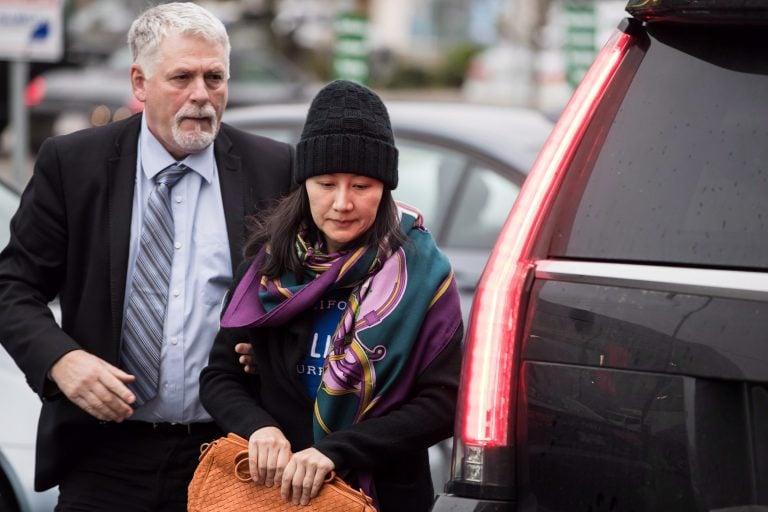Can Trump really intervene in the Meng Wanzhou case?
The short answer is yes. But the result could prove disastrous for both the U.S. and Canada

Meng Wanzhou, right, with a member of her private security detail in Vancouver. (Darryl Dyck/CP)
Share
The Art of the Deal, Donald Trump’s bestselling book, doesn’t have a chapter on judicial independence. So perhaps Canadians shouldn’t have been shocked that, when asked about the case of Huawei CFO Meng Wanzhou, the U.S. president quickly expressed a willingness to use her potential extradition to the U.S. as a bargaining chip in America’s ongoing trade negotiations with China.
“If I think it’s good for what will be certainly the largest trade deal ever made—which is a very important thing—what’s good for national security—I would certainly intervene if I thought it was necessary,” the President told Reuters.
Trump’s words could not have been less opportune, coming as they have while a B.C. judge weighs the extradition of Meng, a Chinese national arrested at the request of the U.S. on accusations of violating economic sanctions against Iran. And the pushback against them was swift. Canada’s foreign affairs minister, Chrystia Freeland, said: “Our extradition partners should not seek to politicize the extradition process or use it for ends other than be pursuit of justice.”
The U.S. Department of Justice also was quick to rebut the president’s remarks. “The Justice Department is law enforcement, we don’t do trade,” said John Demers, assistant attorney general of the department’s national security division, at a Senate Judiciary Committee hearing. “We are not a tool of trade when we bring the cases, and that’s what we do when we see them through to their conclusion.”
That may be how America traditionally operated under the previous 44 presidents, but it still invites the question: if he really wanted to, could the 45th president interfere with the Meng case?
“The attorney general, who oversees the criminal proceedings and the Justice Department, serves at the pleasure of the president and ultimately reports to the president,” says Brian Michael, a former federal prosecutor who is now a partner at the California-based law firm King & Spalding LLP. “The secretary of state is in a similar position. At least in theory, the president has the ability to exercise his authority and give direction to his cabinet secretaries to take specific action.”
So while the Justice Department has historically enjoyed a degree of independence and deference from the White House, that doesn’t stop Trump from testing the boundaries of tradition.
“The easiest and only effective way for Trump to intervene is by pressuring the U.S. Department of Justice and the Eastern District of New York into striking Meng’s name from the sealed indictment that started this whole thing,” explains Gary Botting, a Vancouver lawyer and an expert in extradition cases.
RELATED: Freeland responds—very carefully—to Trump’s remarks on the Huawei case
However, even if Trump were to meddle with the Department of Justice’s work, Michael explains, he could still get involved by using his authority over the State Department. Here’s how: The Justice Department’s office of international affairs puts together the necessary paperwork in support of an extradition request. But those documents are then sent on to the State Department—which in turn transmits those papers to the U.S. embassy in whichever country the fugitive resides. (In this case, that’s Canada.) In Meng’s case, those papers would then need to get to in the hands of Canada’s Department of Justice.
“So, at least in theory—and I’m not aware of an instance where this has happened before—the president could direct the State Department to not transmit the extradition request to Canada,” Michael says. “It would be unusual for the State Department to not transmit extradition papers prepared and requested by the Justice Department. But that’s one way I’d see an opportunity for [Trump] to do it.”
Michael is quick to point out that this hypothetical scenario puts aside the many political and foreign policy ramifications that would arise from such meddling—not least similar tactics being used in retaliation against CEOs and other high-ranking executives from American or Canadian companies who are travelling or working abroad.
And if Trump is serious about drawing Meng’s case into trade talks that are already under way, he’s overlooking some obvious time constraints.
“Under the terms of the extradition treaty, the United States has 60 days from the date of Ms. Meng’s arrest to make a full extradition request,” according to a Department of Justice Canada statement. “Department of Justice officials have a further 30 days to determine whether to issue an Authority to Proceed which will formally commence the extradition process.” Then, finally, an extradition hearing would need to be scheduled in B.C.
All of which is to say, if Trump truly wants to use Meng as a trade bargaining chip, he’ll have to find a way to make it all happen fast. Or, as he wrote in The Art of the Deal: “It pays to move quickly and decisively when the time is right.”
In the last few days, those words that have taken on a chilling new resonance.